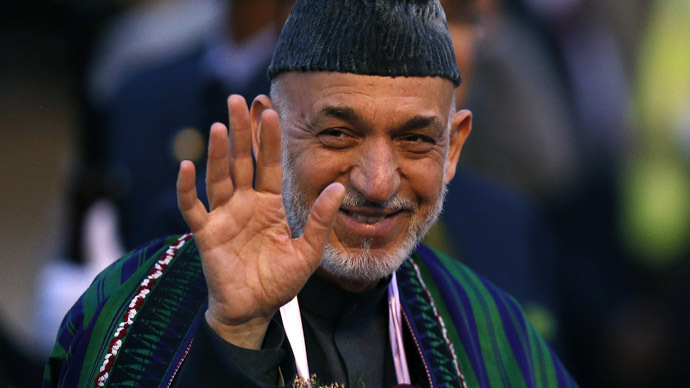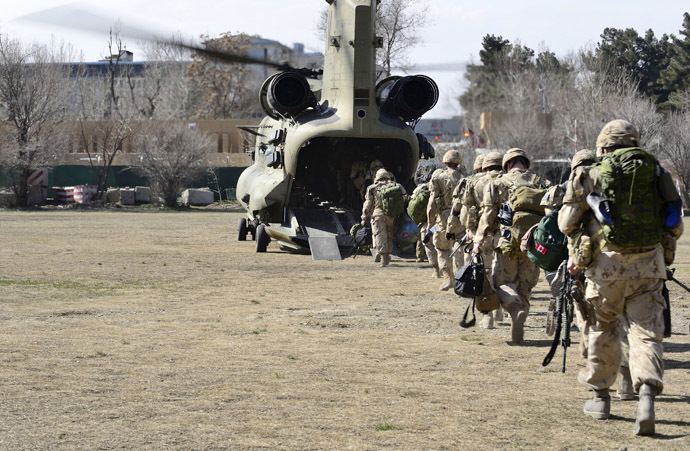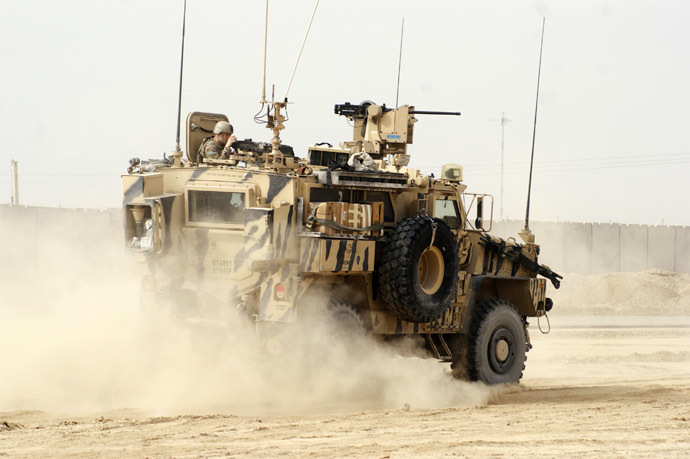‘Any candidate for the Afghan presidency likely to sign security pact with US’

It’s in Afghanistan’s interest to sign a pact with the US and get ongoing support not only from the US but also from other coalition partners, Gregory Copley, editor of the journal Defense & Foreign Affairs, told RT.
RT:Observers in the West say the elections will mark a turning point for Afghanistan. What do you think will change?
Gregory Copley: Of course it will be a turning point. We will see a post-Karzai government and that can only be a new start for the country. We certainly will see violence. The question is what we will see after the election – a gradual decline into polarization between the Pashtun part of country and the Dari-speaking part of the country? If we don’t see a cohesive unified approach to government, we will then see the prospects for dismemberment of Afghanistan over the coming years. But I don’t think we are going to see anything moving very suddenly. We’ll have some violence before the elections, and violence afterwards. The question will start to show itself in the next year or two.
RT:The US and NATO troops are withdrawing, apparently viewing their mission as complete. Have they succeeded in putting Afghanistan on a path to stability?
GC: I wouldn't say they have at all. Afghanistan was rarely stable in the sense of a lot of modern nation-states. The question is what their mission was. Initially it was to hunt down the Al-Qaeda personnel who had been sheltered by the Taliban… it turned into a war against the Taliban and the whole question of the war against terror begged the question what was the strategic objective of the US and the coalition. So we haven’t seen a real answer to that. In fact, what we have seen is that the war in Afghanistan and the war in Iraq, but particularly in Afghanistan, more or less bankrupted the US military, not just of money, but of lots of its equipment and so on. It cost the US its friendly access to Central Asia, and it gave China and Russia the chance to rebuild their relationships in Central Asia. The US has got nothing out of that. It lost its access to Central Asian resources, markets and friendships. What we see at the end of this is an Afghanistan which remains less than stable and it could become very bad indeed; we could see this dismemberment of Afghanistan within the coming decade, or few years even.
What do we have from that? The US has now lost access to Central Asia, the Persian Gulf, and Pakistan, once a strong ally, has been left bruised and vulnerable. And China seems to be one of the few countries which has gained out of all of this, and to some extent the Russian Federation. If Afghanistan does polarize and become dominated by the Dari-speakers, then India will have a profound strategic advantage, which is what they have been seeking. They will have the ability to pressure Pakistan from the Afghan side. So it’s really a no-win situation.
It wasn't that they weren't warned. Our institute, for example, basically said you don’t go into a war without a strategic objective, and that strategic objective has to include the fundamental that it benefits the security and strategic objectives of the country waging the war, in this case the US. There were no clear objectives from Washington about why it was waging the war, other than to retaliate against Al-Qaeda. And then that was quickly lost as an objective as well.

RT:The Pentagon says it is losing fewer soldiers in Afghanistan... yet the opposite is true for Afghan troops. Is the country's army really ready to take on the Taliban?
GC: The US and coalition forces handed over operational and combat responsibility to the Afghan national army and moved more into an advisory and support role. So it was natural that the US and coalition casualties would decline at this phase of the operation and that Afghan national army casualties would rise because they have taken on the combat missions. The Afghan army in many ways is well enough trained to take on the Taliban. And we have to look at a lot of other militias starting to emerge over the coming year or two, so it’s not just the Taliban. The question is where the loyalty of the individual soldier lies and that is going to be very obviously from area to area and individual to individual. So the question is “Can the Afghan national army retain the loyalty of its troops?” and “Can the government retain the loyalty of the army as a whole?” These are the questions. We are going to see the high casualty situations continue for the indefinite future, but that’s nothing new in the Afghan conflict situation of the past many decades.
RT:Will it improve the situation if the new Afghan president accepts the security agreement with Washington that Hamid Karzai refused to sign?
GC: Yes, indeed. All of the candidates for the Afghan presidency are put into a situation where they would probably sign that pact with the US because if they don’t sign it with the US, then few of the other coalition countries are likely to leave any forces at all in Afghanistan on training or support missions. It’s in the interest of Afghanistan that they sign the pact, they get ongoing support from the US and therefore, from the other coalition partners. I think what we are seeing is President Karzai attempting to distance himself from the US, and there are some other personal and family issues involved there as well. But he wants to distance himself from the US to mitigate the antagonism towards him personally, which will arise from the Taliban. I think when he is gone, the situation will change, the pact will be signed and it will be beneficial to Afghanistan. Whether it's beneficial to the US and the coalition partners is highly questionable.

RT:What about the billions the US has invested into Afghanistan over the years? Has the money been put to good use?
GC: Very little has been put to good use. There unquestionably have been some great infrastructural achievements in Afghanistan which will benefit the country in the long run. There have been benefits for the social organization as well, for example, the status of women. These were not the objectives which the US wanted to achieve but they are by-products that will benefit Afghan people. They don’t really benefit the US. So, tens of billions, hundreds of billions of dollars which the US has spent in Afghanistan have been largely wasted. They sidetracked the US from really focusing on emerging and transform global strategic architecture. Now the US is militarily and in many respects politically losing its prestige and capability on a global level, and it’s therefore, unable to rise to other strategic challenges such as for example the present confrontation with Russia over Crimea. I believe that had the US been in a stronger political situation, perhaps with different leadership, we would not have seen that present impasse arisen between the US and Russia and the EU. I think we’d have seen a much more pleasant operating environment in which Russia, Europe and the US would have worked more harmoniously, and I do blame the whole Iraq and Afghan operation for that.
We have come to a watershed in strategic planning. The great logistical capability of the US, which worked so well in World War II and in global strategic rejection, failed in Afghanistan. It tied the US to a militarily impossible framework and if the US is to successfully engage in war in Africa or elsewhere on peacekeeping operations, it has to change its model of military operations.
The statements, views and opinions expressed in this column are solely those of the author and do not necessarily represent those of RT.
The statements, views and opinions expressed in this column are solely those of the author and do not necessarily represent those of RT.












